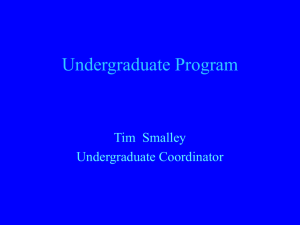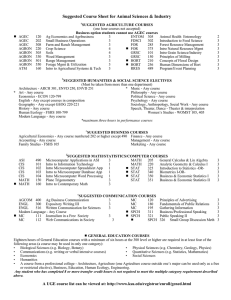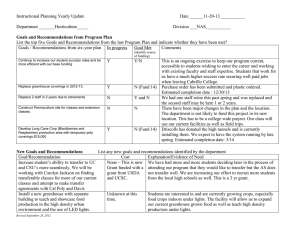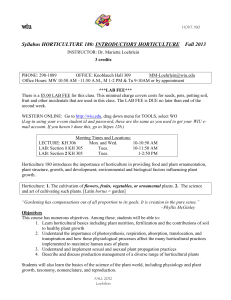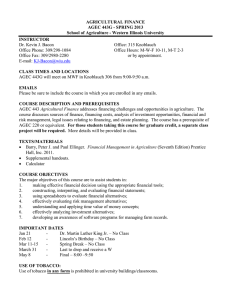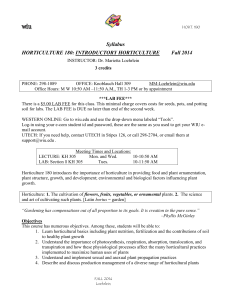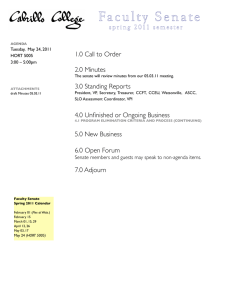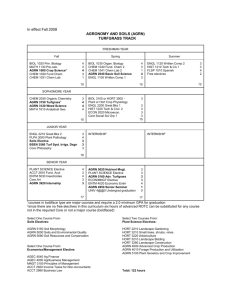Undergraduate and/or Graduate Course and Curriculum Changes ─ Non-Expedited Approval
advertisement
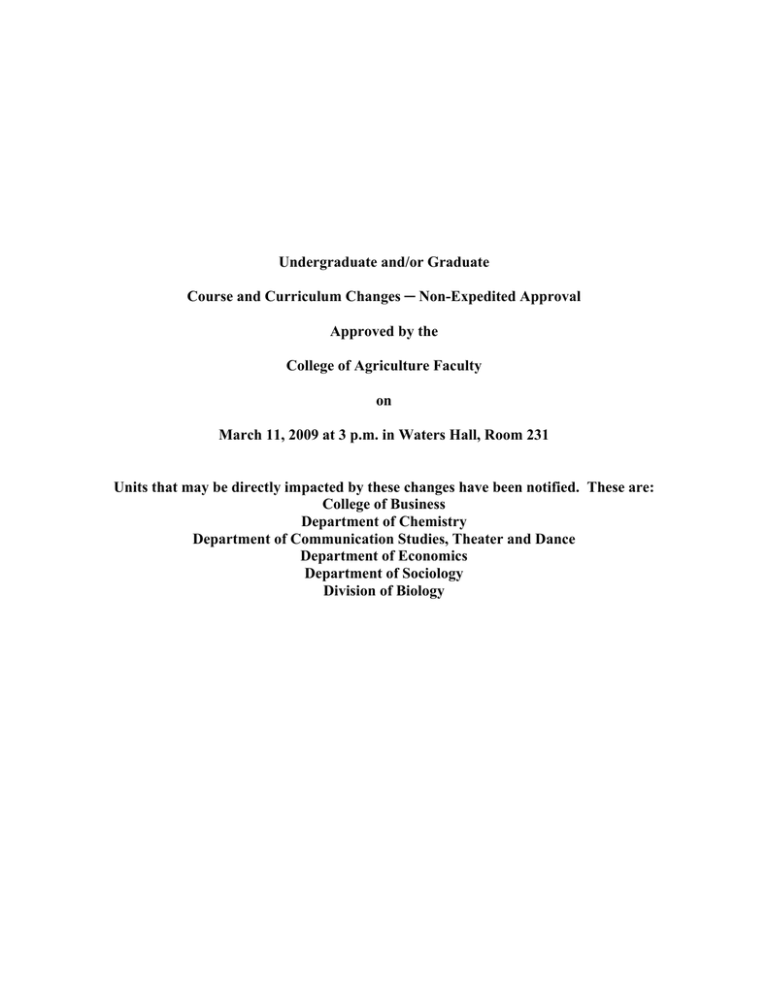
Undergraduate and/or Graduate Course and Curriculum Changes ─ Non-Expedited Approval Approved by the College of Agriculture Faculty on March 11, 2009 at 3 p.m. in Waters Hall, Room 231 Units that may be directly impacted by these changes have been notified. These are: College of Business Department of Chemistry Department of Communication Studies, Theater and Dance Department of Economics Department of Sociology Division of Biology Course and Curriculum Proposals ─ Non-Expedited Process College of Agriculture Spring 2009 Non-expedited Course Changes (599 and below) Horticulture, Forestry and Recreation Resources ADD: HORT 405. Water Issues in the Lawn and Landscape. (3) II. This course will examine critical water issues related to irrigation in urbanizing watersheds, with an emphasis on water quality and quantity. Factors impacting water scarcity and quality will be discussed. Successful completion of this course will help students understand the interrelatedness of incorrect irrigation practices and water quality/quantity, and will equip them to help protect water resources through application of science based irrigation practices. This is a distance education course. Rec. Pr.: Junior standing or one year of experience in the lawn/landscape maintenance industry. RATIONALE: This course will educate students on critical water issues related to irrigation in urbanizing watersheds, with an emphasis on water quality and quantity. IMPACT: Development of the course is supported by the Department of Plant Pathology. This course was previously taught and dropped by the Department of Plant Pathology. EFFECTIVE DATE: Spring 2010 1 Non-expedited Course Changes (600 and above) Agricultural Communications ADD: AGED 786. Topics in Agricultural Education. (1-3) I, II, S. Examination of current topics in agricultural education. Varied specialized topics will be offered so course may be repeated. RATIONALE: Agricultural Education faculty have administratively moved from the College of Education to the College of Agriculture. Secondary teachers of agricultural education need a graduate level course in which current, specialized topics can be taught in order that they can renew teaching certificates and apply the credits toward a masters degree. IMPACT: No impact on other units. EFFECTIVE DATE: Summer 2009 Food Science and Industry FROM: FDSCI 600. Microbiology of Food. (2) I, II, S. This course deals with the isolation, identification, enumeration, and characterization of bacteria, yeasts, molds and other microbes associated with foods and food processing. Effects of physical and chemical agents on micro-organisms will be studied. Microbiological problems in food spoilage, food preservation, food fermentation, and food-borne diseases will be discussed. This is a Web-based lecture course intended for off-campus distance education students. Pr.: BIOL 455. TO: FDSCI 600. Microbiology of Food. (2) I, II, S. This course deals with the isolation, identification, enumeration, and characterization of bacteria, yeasts, molds and other microbes associated with foods and food processing. Effects of physical and chemical agents on micro-organisms will be studied. Microbiological problems in food spoilage, food preservation, food fermentation, and food-borne diseases will be discussed. This is a Web-based lecture course intended for off-campus distance education students. Rec. Pr.: BIOL 455. RATIONALE: The course is only offered by Distance Education and thus most students may not have BIOL 455 because these students will usually take a Microbiology course at another university and will have a different course number. Currently almost all enrollments are usually blocked even though the students have the prerequisite equivalent. Making BIOL 455 a recommended perquisite will alleviate the confusion caused by block enrollments and simplify the student’s registration experience. IMPACT: The Division of Biology has bee notified; a response has not been received. EFFECTIVE DATE: Fall 2009 2 Grain Science and Industry FROM: GRSC 905. Enzyme Applications. (2) I. Theories of enzyme action and function; commercial methods of manufacture and industrial uses, with special emphasis on the role of enzymes in the food industries. Two hours lec. a week. Rec. Pr.: BIOCH 521 and 522. TO: GRSC 905 Enzyme and Bioprocessing Applications (3) I. The course explores the applications of enzymes and microbial cultures in the bioprocessing industry, including food, feed, industrial chemicals and biofuels; and major microbial pathways for product synthesis including a clear understanding of enzyme and microbial kinetics at an advanced level. Three one-hour lectures per week. Rec. Pre.: GRSC 820 or GRSC 740/BAE 740 or BIOCH 755. RATIONALE: This class has not been taught for several years, but now has a new instructor who has expanded and rewritten the content and description to be more appropriate for today’s needs and requirements. This has been approved by the Grain Science faculty. IMPACT: This course will be offered in Grain Science, but will be available to any graduate level student. EFFECTIVE DATE: Fall 2009 3 Horticulture, Forestry and Recreation Resources ADD: HORT 710. Plant Cell, Tissue and Organ Culture. (3) II. Course will cover the principles and laboratory exercises that demonstrate major concepts and practical techniques in plant cell, tissue and organ culture. The history and use of plant cell-, tissue-, and organ- culture for crop improvement will be explained. The variety of tissueculture techniques will be highlighted. Selected readings and practical tissue culture projects will be required. Two hours lecture and three hours lab per week. Rec. Pr.: HORT 350. RATIONALE: Plant cell, tissue and organ culture is an important research tool in both basic and applied studies as well as in commercial application. This course will provide horticulture and plant related-science major students an opportunity to learn about fundamental principles and techniques in plant cell, tissue and organ culture which can be applied to all crop plants, including agronomic, horticulture, and forestry crops for germplasm improvement. IMPACT: No impact on other departments. EFFECTIVE DATE: Spring 2010 ADD: HORT 910. Advances in Plant Cell Culture. (2) II. Course will cover current topics in plant cell culture, applications and commercial practices, with emphasis on plant genetic improvement. Research-level skills in this area will be taught. Two hours lecture a week Odd years. Rec. Pr.: HORT 710. RATIONALE: One of the newest and most exciting applications of plant cell culture is molecular farming using modern plant cell and tissue culture biotechnology. This course will provide horticulture and plant related science majors an opportunity to learn advanced cell and tissue culture theories for crop genetic improvement. IMPACT: Development of the course is supported by the Department of Plant Pathology. EFFECTIVE DATE: Spring 2010 4 Undergraduate Curriculum Changes Food Science and Industry Food Science and Industry B.S. Professional and Processing Electives From: FOOD SCIENCE ELECTIVES ASI 303 Hist & Attitudes Animal Ag 3 ASI 315 Livestock and Meat Evaluation 3 ASI 490 Micro Computer Applications 3 ASI 500 Genetics 3 ASI 533 Anatomy & Physiology 4 ASI 595 Contemp Issues in An Sci & Ag 3 ASI 645 Poultry Management 3 AGRON335 Environmental Quality 3 FDSCI 430 Food Products Evaluation 3 FDSCI 603 Food Science Internship 1-6 FDSCI 630 Food Science Problems 1-3 FDSCI 713 Rapid Methods and Auto in Micro 2 FDSCI 791 Adv Application of HACCP Prin 3 GNHE 310 Human Needs 3 HN 352 Personal Wellness 3 HN 413 Science of Food 4 HN 701 Sensory Analysis 2-3 GRSC 602 Cereal Science 3 GRSC 651 Food and Feed Prod Protection 4 GRSC 661 Quality of Feed & Food Ingrdnts 3 STAT 341 Biometrics II 3 NUTRITION ELECTIVES HN 400 Human Nutrition 3 HN 600 Public Health Nutrition 3 HN 610 Lifespan Nutrition 3 HN 620 Nutrient Metabolism 4 HN 630 Clinical Nutrition 5 HN 635 Nutrition and Exercise 3 COMMUNICATIONS AGCOM 210 Communications in Ag Ind 3 AGCOM 400 Ag Business Comm 3 ENGL 300 Expository Writing III 3 ENGL 516 Written Communication for Sci. 3 MKTG 542 Prof Selling and Sales Mngnt 3 MC 110 Mass Comm in Society 3 MC 120 Principles of Advertising 3 MC 180 Fund of Public Relations 3 SOCWK310 Fund Comm for Ag & Food Sci 3 SPCH 311 Bus and Professional Speaking 3 SPCH 321 Public Speaking II 3 SPCH 322 Interpersonal Communication 3 SPCH 326 Small Group Discussion Methods 3 ANY FOREIGN LANGUAGE Completion of ASI 395- Meat Judging TECHNOLOGY ELECTIVES ATM 160 Engineered Systems & Tech ATM 450 Sensors/Control Ag Biol Systems ATM 455 Engines and Power Transfer ATM 661 Watershed Management BAE 345 Properties of Biological Materials GRSC 540 Engr Appl Grain/Food Processing GRSC 541 Engr Appl Grain/Food Proc Lab 3 3 3 3 2 3 1 PROCESSING ELECTIVES ASI 310 Poultry Products Evaluation ASI 350 Meat Science ASI 361 Meat Animal Processing ASI 370 Principles of Meat Evaluation ASI 405 Fundamentals of Milk Processing ASI 495 Advanced Meat Evaluation ASI 608 Dairy Food Processing & Technol ASI 610 Processed Meat Operations ASI 640 Poultry Products Technology ASI 671 Meat Selection and Utilization ASI 777 Meat Technology GRSC 101 Intro to Grain Science and Industry GRSC 150 Principles of Milling GRSC 505 Cereal & Feed Analysis GRSC 625 Flour and Dough Testing GRSC 635 Baking Science I GRSC 636 Baking Science I Lab GRSC 737 Baking Science II GRSC 738 Baking Science II Lab BUSINESS/MANAGEMENT ELECTIVES ACCTG231 Accounting Business Operations ACCTG241 Accounting Investing & Financing MANGT420 Management Concepts MKTG400 Marketing FINAN450 Principles of Finance AGEC 120 Ag Econ & Agribusiness AGEC 308 Farm and Ranch Management AGEC 318 Food & Agribusiness Management AGEC 410 Agricultural Policy AGEC 415 Global Ag Econ, Hunger & Poverty AGEC 420 Commodity Futures AGEC 505 Agricultural Market Structures AGEC 515 Food and Agribusiness Marketing AGEC 520 Market Fund & Futures Opt Trad AGEC 570 Food Mfg, Distribution & Retailing AGEC 623 International Agriculture Trade AGEC 632 Agribusiness Logistics CIS 101 Intro to Information Technology CIS 102 Intro to PC Spreadsheet Applications CIS 103 Intro to PC Database Applications CIS 104 Intro to PC Word Processing CIS 105 Intro to Computer Programming ECON 120 Prin Micro Economics ECON 520 Intermediate Micro Economics MANGT300 Intro to Total Quality Management MANGT366 Management Info Systems MANGT390 Business Law I MANGT421 Intro to Operations Management MANGT530 Industrial & Labor Relations MANGT531 Personnel & Human Resource Mgmt. MKTG450 Consumer Behavior MKTG541 Retailing MKTG542 Prof Selling and Sales Management 2 3 2 2 3 2 3 2 3 2 4 3 3 3 3 2 2 3 1 3 3 3 3 3 3 3 3 3 3 3 3 3 3 3 3 3 1 1 1 1 1 3 3 1 3 3 3 3 3 3 3 3 5 To: FOOD SCIENCE ELECTIVES ASI 303 Hist & Attitudes Animal Ag ASI 315 Livestock and Meat Evaluation ASI 500 Genetics ASI 533 Anatomy & Physiology ASI 595 Contemporary Issues in An Sci & Ag ASI 645 Poultry Management ASI 660 International Study Experience in ASI AGRON335 Environmental Quality BIOL 340 Human Body BIOL 450 Modern Genetics BIOL 541 Cell Biology CHM 550 Organic Chemistry II CHM 551 Organic Chemistry II Lab FDSCI 430 Food Products Evaluation FDSCI 603 Food Science Internship FDSCI 630 Food Science Problems FDSCI 713 Rapid Methods and Auto in Microbiol FDSCI 730 Food Safety and Security FDSCI 791 Adv Application of HACCP Prin GENAG505 Comparative Agriculture GNHE 310 Human Needs HN 352 Personal Wellness HN 400 Human Nutrition HN 413 Science of Food HN 600 Public Health Nutrition HN 610 Lifespan Nutrition HN 620 Nutrient Metabolism HN 630 Clinical Nutrition HN 635 Nutrition and Exercise HN 701 Sensory Analysis GRSC 602 Cereal Science GRSC 651 Food and Feed Prod Protection GRSC 661 Quality of Feed & Food Ingredients PHYS 114 General Physics II STAT 341 Biometrics II COMMUNICATIONS AGCOM400 Ag Business Communications AGCOM590 New Media Technology AGCOM610 Crisis Communication COMM 311 Bus and Professional Speaking COMM 321 Public Speaking II COMM 322 Interpersonal Communication COMM 326 Small Group Discussion Methods COMM 535 Communication Leadership ENGL 300 Expository Writing III ENGL 516 Written Communication for Sci. GENAG450 Citizenship and Ethics in Ag MKTG 542 Prof Selling and Sales Management MC 110 Mass Comm in Society MC 120 Principles of Advertising MC 180 Fund of Public Relations SOCWK310 Fund Comm for Ag & Food Sci #ANY FOREIGN LANGUAGE Completion of ASI 495- Meat Judging 3 3 3 4 3 3 0-6 3 8 4 3 3 2 3 1-6 1-3 2 2 3 2-4 3 3 3 4 3 3 4 5 3 2-3 3 4 3 4 3 3 3 3 3 3 3 3 3 3 3 3 3 3 3 3 3 TECHNOLOGY ELECTIVES ASI 490 Micro Computer Applications 3 ATM 160 Engineered Systems & Tech 3 ATM 450 Sensors/Control Ag Biol Systems 3 ATM 455 Engines and Power Transfer 3 ATM 661 Watershed Management 3 BAE 345 Properties of Biological Materials 2 CIS 101 Intro to Information Technology 1 CIS 102 Intro to PC Spreadsheet Applications 1 CIS 103 Intro to PC Database Applications 1 CIS 104 Intro to PC Word Processing 1 CIS 105 Intro to Computer Programming 1 GRSC 540 Engr Appl Grain/Food Processing 3 GRSC 541 Engr Appl Grain/Food Proc Lab 1 PROCESSING ELECTIVES ASI 310 Poultry Products Evaluation 2 ASI 350 Meat Science 3 ASI 361 Meat Animal Processing 2 ASI 370 Principles of Meat Evaluation 2 ASI 405 Fundamentals of Milk Processing 3 ASI 495 Advanced Meat Evaluation 2 ASI 608 Dairy Food Processing & Technology 3 ASI 610 Processed Meat Operations 2 ASI 640 Poultry Products Technology 3 ASI 671 Meat Selection and Utilization 2 ASI 777 Meat Technology 3 FDSCI 660 International Study Experience Food Sci0-6 GRSC 101 Intro to Grain Science and Industry 3 GRSC 150 Principles of Milling 3 GRSC 505 Cereal & Feed Analysis 3 GRSC 625 Flour and Dough Testing 3 GRSC 635 Baking Science I 2 GRSC 636 Baking Science I Lab 2 GRSC 737 Baking Science II 3 GRSC 738 Baking Science II Lab 1 BUSINESS, MANAGEMENT & ECON ELECTIVES ACCTG231 Accounting Business Operations 3 ACCTG241 Accounting Investing & Financing 3 MANGT420 Management Concepts 3 MKTG400 Marketing 3 FINAN450 Principles of Finance 3 AGEC 120 Ag Econ & Agribusiness 3 AGEC 308 Farm and Ranch Management 3 AGEC 318 Food & Agribusiness Management 3 AGEC 410 Agricultural Policy 3 AGEC 415 Global Ag Econ, Hunger & Poverty 3 AGEC 420 Commodity Futures 3 AGEC 505 Agricultural Market Structures 3 AGEC 515 Food and Agribusiness Marketing 3 AGEC 516 Ag Law and Economics 3 AGEC 520 Market Fund & Futures Opt Trad 3 AGEC 570 Food Mfg, Distribution & Retailing 3 AGEC 599 Food and Agribusiness Strategies 3 AGEC 605 Price Analysis and Forecasting 3 AGEC 623 International Agriculture Trade 3 AGEC 632 Agribusiness Logistics 3 AGEC 680 Risk Management 3 ECON 120 Prin Micro Economics 3 ECON 520 Intermediate Micro Economics 3 MANGT300 Intro to Total Quality Management 1 MANGT366 Management Info Systems 3 MANGT390 Business Law I 3 MANGT421 Intro to Operations Management 3 MANGT530 Industrial & Labor Relations 3 MANGT531 Personnel & Human Resource Mgmt. 3 MKTG450 Consumer Behavior 3 MKTG541 Retailing 3 MKTG542 Prof Selling and Sales Management 3 6 RATIONALE: The department annually updates the professional and processing electives list to incorporate new courses and remove those no longer being taught. The list is a suggested electives list that allows for specialization and flexibility to reflect the professional goals of students. The list is not inclusive of all possible professional and processing electives, but is an updated guide of suggested electives and those that have been commonly used. IMPACT: The Division of Biology, Department of Chemistry, and Department of Communication Studies, Theater and Dance have been notified. The Department of Chemistry and the Department of Communication Studies, Theater and Dance have indicated no concerns with the changes. A response has not been received from the Division of Biology. EFFECTIVE DATE: Fall 2009 7 Horticulture, Forestry and Recreation Resources Horticulture Major: Landscape Design Option FROM: TO: Landscape Design Option Landscape Design Option Pest Management Elective--------------------------------2 HORT 583 Survey of Hort. Ornamental & Food Crop Pests 1 HORT 587 Turfgrass Diseases & Their Mgt 1 HORT 588 Turfgrass Weeds & Their Mgt. 1 HORT 589 Turfgrass Insects & Their Mgt. 1 Pest Management Elective--------------------------------2 HORT 583 Survey of Hort. Ornamental & Food Crop Pests 1 HORT 587 Turfgrass Diseases & Their Mgt 1 HORT 588 Turfgrass Weeds & Their Mgt. 1 HORT 589 Turfgrass Insects & Their Mgt. 1 PLPTH 590 Landscape Diseases 2 Biology Elective-----------------------------------------3-4 BIOL 320 Economic Botany 3 BIOL 529 Fundamentals of Ecology 3 BIOL 551 Taxonomy of Flowering Plants 4 Biology Elective-----------------------------------------3-4 Any BIOL course numbered 300 or higher. RATIONALE: Course was inadvertently omitted from Pest Management Elective list when the Landscape Design Curriculum was modified for Fall 2008. We wish to correct this. Desire to broaden the choice of courses for the students in the Biology Elective category. IMPACT: The Division of Biology has been notified, and they have indicated they have no concerns about the changes. The Department of Plant Pathology supports this change. EFFECTIVE DATE: Fall 2009 8 Graduate Curriculum Changes Agricultural Economics FROM: Ph.D. Agricultural Economics Program (current) Topic Area Credit Hours Economic Theory ECON 735 Mathematical Economics ECON 940 Advanced Microeconomic Theory I ECON 945 Advanced Microeconomic Theory II ECON 805 Income and Employment Theory I ECON 905 Income and Employment Theory II and select one of the following: ECON 801, ECON 823 ECON 832, ECON 860, ECON 890, ECON 915, ECON 920, ECON 925, ECON 927, ECON 947, ECON 948, ECON 955, or ECON 981 18 3 3 3 3 3 Research Methodology ECON 930 Econometrics II AGEC 901 Research Methods in Economics AGEC 936 Quantitative Topics in Agricultural Economics and select one of the following: STAT 770 Theory of Statistics I STAT 771 Theory of Statistics II ECON 890 Time Series Econometrics ECON 890 Microeconomics Panel Data Econometrics 12 3 3 3 3 3 3 3 Additional Required Agricultural Economics Courses AGEC 905 Agricultural Demand and Price Analysis AGEC 923 Economics of Agricultural Production 6 3 3 General Electives* (700 level and higher) * Includes the following M.S. level course prerequisites ECON 830 Econometrics I AGEC 712 Optimization Techniques for Agricultural Economics AGEC 823 Production Economics II AGEC 805 Agricultural Marketing STAT 706 Basic Elements of Statistical Theory 24 3 3 3 3 3 3 60 Total Course Hours 30 Dissertation Hours 90 Total Credit Hours The following courses developed for the Masters of Agribusiness are not allowed on a student’s program of study: AGEC 700, AGEC 701, AGEC 713, AGEC 720, AGEC 730, AGEC 760, AGEC 761, and AGEC 770. 9 Ph.D. Agricultural Economics Specialty Areas (current) Agribusiness FINAN 815 MANGT 820 MKTIB 810 AGEC 890 ECON 925 Managerial Finance I Behavioral Management Theory Marketing Concepts and Research Advanced Food and Agribusiness Management Location of Economics Activites (may be replaced with ECON 947 or 948) Community and Regional Economics ECON 832 Public Sector Analysis ECON 925 Location of Economic Activities ECON 955 Theory and Methods of Regional Economic Analysis SOCIO 832 Sociology of Community AGEC 955 Advanced Topics in Community and Regional Economics International Development Growth and Development Theories ECON 860 AGEC 815 International Agricultural Development AGEC 816 Farming Systems Approach to Sustainable Development SOCIO 824 Qualitative Methodology Natural Resources AGEC 825 Natural Resource Policy AGEC 925 Advanced Resource and Environmental Economics ECON 947 Industrial Organization (may be replaced with IMSE 983) Price Analysis/Marketing Agricultural Demand and Price Analysis AGEC 905 AGEC 936 Quantitative Topics in Agricultural Economics STAT 730 Multivariate Statistical Methods (may be replaced with STAT 880) Price and Income Policies for Agriculture (may be replaced with MKTIB 810) AGEC 810 Trade AGEC 840 ECON 981 Econ 947 International Markets and Agricultural Trade International Trade Theory and Policy Industrial Organization (may be replaced with AGEC 810) Production/Farm Management/Finance AGEC 923 Economics of Agricultural Production AGEC 812 Advanced Farm Economics (may be replaced with FINAN 815) Select 2 from the following list: AGEC 936, IMSE 864, IMSE 982, IMSE 983, IMSE 830, IMSE 991 or EECE 870 10 TO: Ph.D. Agricultural Economics Program (proposed) Topic Area Credit Hours Economic Theory ECON 735 Mathematical Economics ECON 940 Advanced Microeconomic Theory I ECON 945 Advanced Microeconomic Theory II ECON 805 Income and Employment Theory I ECON 905 Income and Employment Theory II and select one of the following: ECON 801, ECON 823 ECON 832, ECON 860, ECON 890, ECON 915, ECON 920, ECON 925, ECON 927, ECON 947, ECON 948, ECON 955, or ECON 981 18 3 3 3 3 3 Research Methodology ECON 930 Econometrics II AGEC 901 Research Methods in Economics AGEC 936 Quantitative Topics in Agricultural Economics and select one of the following: STAT 770 Theory of Statistics I STAT 771 Theory of Statistics II ECON 890 Time Series Econometrics ECON 890 Microeconomics Panel Data Econometrics 12 3 3 3 3 3 3 3 Additional Required Agricultural Economics Courses AGEC 905 Agricultural Demand and Price Analysis AGEC 923 Economics of Agricultural Production 6 3 3 Specialty Area 6 General Electives* (700 level and higher) * Must include the following M.S. level courses or their equivalent ECON 830 Econometrics I AGEC 712 Optimization Techniques for Agricultural Economics AGEC 823 Production Economics II AGEC 805 Agricultural Marketing STAT 706 Basic Elements of Statistical Theory 18 3 3 3 3 3 3 60 Total Course Hours 30 Dissertation Hours 90 Total Credit Hours The following courses developed for the Masters of Agribusiness are not allowed on a student’s program of study: AGEC 700, AGEC 701, AGEC 713, AGEC 720, AGEC 730, AGEC 760, AGEC 761, and AGEC 770. 11 Ph.D. Agricultural Economics Specialty Areas (proposed) Agribusiness (two of the following with at least one from AGEC 880 or AGEC 890) AGEC 890 Advanced Food and Agribusiness Management AGEC 880 Agribusiness Industry Structures FINAN 815 Managerial Finance I MANGT 820 Behavioral Management Theory MKTG 810 Marketing Concepts and Research ECON 947 Industrial Organization* Community and Regional Economics (two of the following) ECON 832 Public Sector Analysis* ECON 925 Location of Economic Activities* ECON 955 Theory and Methods of Regional Economic Analysis* SOCIO 832 Sociology of Community AGEC 955 Advanced Topics in Community and Regional Economics International Development/Trade/Policy (two of the following) AGEC 815 International Agricultural Development AGEC 840 International Markets and Agricultural Trade AGEC 810 Price and Income Policies for Agriculture ECON 860 Growth and Development Theories* ECON 981 International Trade Theory and Policy* Natural Resources AGEC 825 Natural Resource Policy AGEC 925 Advanced Resource and Environmental Economics Price Analysis/Marketing AGEC 810 Price and Income Policies for Agriculture, or AGEC 880 Agribusiness Industry Structures and one of the following STAT 730 Multivariate Statistical Methods STAT 880 Time Series Analysis ECON 890 Time Series Econometrics or Panel Data Econometrics* Production/Farm Management/Finance AGEC 812 Advanced Farm Economics (may be replaced with FINAN 815) and one of the following IMSE 864, IMSE 982, IMSE 983, IMSE 830, IMSE 991 or EECE 870 Students are encouraged to consult with their advisor(s) about additional courses to enhance their training in a field. Alternative specialties, or variances to those described above, may be designed by a student’s supervisory committee with the approval of the graduate committee. *No course can be used to meet both a specialty and a core program requirement 12 RATIONALE: The proposed changes to the PhD Specialty Areas address disparities across specialties in the number of credit hours required. As currently constituted, specialty (or field) requirements vary from two to five courses in addition to core requirements, resulting in an incentive to choose a specialty with fewer requirements. The proposed change results in a uniform requirement of two courses for a specialty, and removes from specialty areas any courses that are already part of the core requirements. The typical requirement for a specialty field at other institutions is two semester courses. Our Economics Department, with whom this Ph.D. is jointly administered, also requires two courses for a specialty area. One substantive change to individual specialty areas is the combining of the existing International Development and Trade specialties into a combined International Development/Trade/Policy specialty. The change offers students more flexibility to target specialized interests within a broader topic area. The wording at the bottom– “Alternative specialties may be designed by a student’s supervisory committee with the approval of the graduate committee.” – does not represent a change. Our Policies and Procedures document already contains similar language but it hadn’t been placed on this page. The wording “No course can be used to meet both a specialty and a core program requirement” enforces the idea that a specialty requires two courses in addition to the core requirements. The proposal also involves listing the 6-hour specialty requirement as a separate line on our PhD Program description, thereby reducing the number of General Electives from 24 to 18. The proposal also involves a minor change in the wording in the General Electives section from “Includes the following M.S. level course prerequisites” - which is somewhat ambiguous and could be interpreted to mean either ‘must include” or “may include” - to “Must include the following M.S. level courses or their equivalent.” Some of the listed courses are no longer required prerequisites – hence the word ‘prerequisites’ is dropped. The proposed changes were unanimously approved at Dept. of Agricultural Economics faculty meetings on November 13 and December 9, 2008. IMPACT: Because some of their courses appear in the current or proposed specialties, the Economics Department (Dr. Bill Blankenau), Sociology Department (Dr. Gerad Mittendorf), and the College of Business (Dr. Jeff Katz) have been notified about the proposed changes. None have communicated any concerns about the changes. The proposed changes are expected to have minimal impact on courses in other Departments. EFFECTIVE DATE: Summer 2009 13 New Graduate Curriculum(s) Horticulture, Forestry and Recreation Resources New Program Proposal Basic Program Information 1. Proposing Institution: Kansas State University 2. Title of proposed program: Graduate Certificate in Horticultural Therapy 3. Degree to be offered: Graduate Certificate 4. Anticipated date of implementation: Fall 2009 5. Responsible department(s): Horticulture, Forestry, and Recreation Resources 14 Program Proposal Narrative This proposal responds to the need for graduate-level horticultural therapy practitioner training to keep pace in the allied-therapy health field; the increasing number of requests for a horticultural therapy curriculum offered via distance education; an international and national demand to K-State for educational opportunities in horticultural therapy; and the strategic prioritization efforts of the Department of Horticulture, Forestry, and Recreation Resources and the College of Agriculture. Horticultural therapy is a method in which a trained Horticultural Therapist uses live plants and the growing environment to heal and rehabilitate people. There are four essential elements in the practice of horticultural therapy: 1) a defined treatment procedure that focuses on horticultural or gardening activities; 2) a client with a diagnosed problem who is in treatment for that problem; 3) a treatment goal that can be measured and evaluated, and; 4) a trained professional to deliver the treatment. Treatment goals in horticultural therapy programs typically target social, psychological, physical, and cognitive health outcomes. Horticultural therapy practitioners often time work as private consultants that work with a variety of client groups and settings while others are directly hired by one institution. From a recent survey of registered horticultural therapists, the most common settings for horticultural therapy programs were vocational training centers, rehabilitation hospitals, nursing homes, botanic gardens, veteran’s facilities, hospice, alcohol treatment centers and cancer treatment centers. Horticultural therapy is considered a complimentary therapy along with physicians, psychiatrists, psychologists, occupational therapists, physical therapists, behavioral specialists, vocational skills instructors, and others. Thus horticultural therapy practitioners must be experts on the medical and psychological benefits of gardening and facilitating improvement of the patients’ physical, social, and mental well-being. A. Educational Objectives Upon completing the graduate certificate program in horticultural therapy students will • Be able to explain the delivery models and systems used in settings where horticultural therapy is currently practiced and where it is emerging as a service • Have achieved entry-level competence through a combination of academic and fieldwork education • Be prepared to articulate and apply horticultural therapy theory and evidence-based evaluations and interventions to achieve expected outcomes • Be prepared to be a lifelong learner and keep current with evidence-based professional practice • Uphold the ethical standards, values, and attitudes of the horticultural therapy profession • Understand the distinct roles and responsibilities of the horticultural therapist • Be prepared to advocate as a professional for the horticultural therapy services offered and for the recipients of those services • Be prepared to be an effective consumer of the latest research and knowledge bases that support practice and contribute to the growth and dissemination of research and knowledge B. Certificate Program Courses The Graduate Certificate in Horticultural Therapy consists of 16 credit hours in required courses. Required courses: HORT 750 Orientation to Horticultural Therapy 1 cr HORT 751 Human Issues in Horticultural Therapy 3 cr HORT 752 Horticulture in Horticultural Therapy 3 cr HORT 753 Clinical Skills in HT 6 cr HORT 755 Practicum in Horticultural Therapy 3 cr 15 COURSE DESCRIPTIONS HORT 750 Orientation to Horticultural Therapy 1cr (Fall, Spring) This course will introduce students to online delivery methods, graduate level research, writing and technology skills, create a community of practice, and introduce students to the profession of horticultural therapy. HORT 751 Human Issues in Horticultural Therapy 3cr (Fall, Spring) This course will explore human issues in horticulture generally, and human issues in horticultural therapy specifically. Consideration of selected topics and issues such as people-plant relationship theories, horticultural therapy as a specialized allied health field, health-care gardens and their use, societal impacts on horticultural therapy, and research issues. Provides students with a knowledge and understanding of the literature in horticultural therapy and develops an appreciation of the interrelationships involved in this multidisciplinary area. HORT 752 Horticulture in Horticultural Therapy 3cr (Spring) Application of horticulture principles and practices in therapeutic settings; considerations for greenhouse systems operations and management in therapeutic settings; landscape maintenance, fruit and vegetable gardening, and production horticulture as part of a therapeutic program; and plant propagation for production and therapy. HORT 753 Clinical Skills in Horticultural Therapy 6cr (Summer through Fall) This course begins summer semester, concludes fall semester, and requires two 5-day on-site experiences. Development of horticultural therapy skills and methodology is presented through real-life case studies. New developments and applications of gardening or horticultural activities for special populations will be emphasized. Procedures for management of horticultural therapy programs, designing therapeutic or rehabilitation activities, and evaluation methods will be discussed. Instruction, practice, and evaluation of clinical skills with population groups typically served through horticultural therapy. Pr.: HORT 751. HORT 755 Practicum in Horticultural Therapy 3cr (Fall, Spring) The practicum is a means of demonstrating the interconnections between ‘theory’ and ‘practice’. By conducting a practicum project, students demonstrate the ability to apply concepts and ideas from their study of horticultural therapy to a specific population or setting. Pr.: HORT 752, HORT 753 C. Meeting the Educational Objectives The educational objectives will be achieved through program content that will include: • Foundational content: prerequisite coursework in the behavioral and horticultural sciences • Basic tenets of horticultural therapy: the history and philosophical base of the profession; the application of horticulture as therapy in various settings and with various population groups; the role of horticulture in the promotion of health and the prevention of disease and disability; client and facility assessment to formulate an intervention plan (HORT 751, HORT 753) • Horticultural therapy theoretical perspectives: describe theories that underlie the practice of horticultural therapy; compare and contrast models of practice; how to use theories and models in horticultural therapy evaluation and intervention (HORT 751) • Screening, evaluation, and referral: the use of standardized and non-standardized screening and assessment tools to determine the need of horticultural therapy intervention; the selection of appropriate assessment tools based on client needs and contextual factors; procedures and protocols when administering assessments; factors that might bias assessment results, such as culture, disability status, and situational variables; documentation procedures to adhere to facility, local, state, federal, and reimbursement agencies (HORT 753, HORT 755) • Formulation and implementation of an intervention plan: the use of evaluation findings based on appropriate theoretical approaches, models of practice, and frames of reference to develop 16 • • • horticulture-based intervention plans and strategies based on the stated needs of the client as well as data gathered during the evaluation process in collaboration with the client and others (HORT 752, HORT 753, HORT 755) Context of service delivery: the differentiation among the contexts of health care, education, community, and social systems as they relate to the practice of horticultural therapy; the current policy issues and social, economic, political, geographic, and demographic factors that influence the contexts for practice of horticultural therapy; the role and responsibility of the practitioner to address changes in service delivery policies to effect changes in the system, and to identify opportunities in emerging practice areas; the trends in models of service delivery and their potential effect on the practice of horticultural therapy (HORT 750, HORT 751, HORT 753) Management of horticultural therapy services: how the various practice settings (e.g. medical institutions, school systems, community systems) affect the delivery of horticultural therapy services; the impact of contextual factors on the management and delivery of horticultural therapy services; how to plan, develop, organize, and market the delivery of services (HORT 753, HORT 755) Research: the importance of research, scholarly activities, and the continued development of a body of knowledge relevant to the profession of horticultural therapy; how to locate, understand, and evaluate information, including the quality of research evidence; the use of research literature to make evidence-based decisions; how to understand and critique the validity of research studies, including designs (both quantitative and qualitative) and methodologies (HORT 750, HORT 751) D. Program Need a. Student Demand There are several indicators in support of student interest in this program. Beginning in 1991, the first distance education course in horticultural therapy was offered at K-State. HORT 780, a one-credit course, was taught as a series of 15 videotape lectures. Since this first distance education course, there have been continued requests for more horticultural therapy distance education offerings. Currently there are four courses offered via distance education: HORT 256, Human Dimensions of Horticulture; HORT 525, Horticulture for Special Populations; HORT 640, Problems in Horticulture/Horticulture Therapy; and HORT 880, Topics in Horticulture/Horticulture Therapy. With little to no marketing, enrollment in the distance education courses since the 2003-2004 academic year has averaged 33 students per year; HORT 256 has averaged 20 students; HORT 525 6 students; HORT 640 5 students; and HORT 880 3 students (see table below). HORT 525 and HORT 640 are available for undergraduate or graduate credit with 33-35% of students enrolling for graduate credit (see table below). These enrollment numbers show that Distance Education is an important component of the HT program. A large percentage of students are non-traditional, involved with family or employment situations and unable to relocate to Manhattan, Kansas. Enrollment in Horticultural Therapy Distance Education Courses Course 2003-2004 2004-2005 2005-2006 2006-2007 HORT 256 HORT 525 HORT 640 HORT 880 28 12 6 4 17 6 2 3 15 3 7 1 21 4 5 (not offered) Total 81 25 20 8 Graduate Enrollment in Horticultural Therapy Distance Education Courses Course 2003-2004 2004-2005 2005-2006 2006-2007 3 2 3 2 HORT 525 0 2 3 2 HORT 640 4 3 1 (not offered) HORT 880 4 year average 20 6 5 3 Total 10 7 8 17 Saved email communication from perspective students to Shoemaker demonstrates the interest in graduate education and distance learning opportunities. All inquiries were for graduate education, the majority of the inquiries were for information on a Masters program, and almost half also asked if there were distance learning opportunities. Email inquiries about graduate education received by Shoemaker Year Inquiries about a Inquiries about a Ph.D. Inquiries about distance learning M.S. 25 4 10 2007 - 2008 Since 2001, 14 students have worked in the area of horticultural therapy for their M.S. in the HFRR campus-based program. Of those students, 8 of them wanted to learn how to be a horticultural therapy practitioner and none of them have continued in a Ph.D. program. If a graduate-level practitioner training program had been available, 8 of the 14 would have chosen that option over our current research-based M.S. program. It is not known how many of them would have preferred a distance education graduate program. The American Horticultural Therapy Associations new professional registration criterion requires college accredited horticultural therapy instruction. Currently, most individuals receive their horticultural therapy instruction through certificate programs at public gardens or not-for-profit institutes. This creates a new demand for college credit horticultural therapy instruction. The campus-based BS in horticultural therapy was discontinued due to consistent low enrollment. The department currently offers campus-based horticultural therapy specializations at the undergraduate and graduate level. Enrollment for the undergraduate horticultural therapy specialization continues to be low. The typical HT student is a non-traditional student, may be a career-changer, is typically place-bound, and usually has at least one higher-education degree (AHTA Board research, Chicago Botanic Garden market research). These characteristics of our primary student body explain why they are not likely to or are not able to move to Manhattan to participate in our campus-based undergraduate program but are highly likely to participate in a distance-education graduate program. b. Demand for Graduates The dramatic changes in the health care field over the past ten years, primarily the shift to managed care, have influenced the profession of horticultural therapy and other allied therapy professions such as art therapy, music therapy, and occupational therapy. A study of these allied therapy professions by the AHTA Professional Standard Task Force in 2004 determined that the current registration process offered by AHTA would not be considered adequate by insurance companies and the educational standards were very sub-standard in today’s marketplace. As a result, AHTA has focused on raising the educational and competency requirements for registered clinicians. Starting in fall 2008, a bachelor’s degree and a minimum number of college credits in three subject areas [horticultural therapy (9 credits), horticulture (12 credits), and human services (12 credits)], will be required. The biggest challenge with these new standards for registration will be obtaining the college credit requirement in horticultural therapy. There are very few universities currently offering coursework in horticultural therapy and only K-State offers courses via distance education. c. Locational and comparative advantages Currently there are no other comparable programs in the State of Kansas or the nation. The AHTA web site lists two other universities offering an option in horticultural therapy at the undergraduate level (Rutgers University and University of Maine – Orono) and two university certificate programs at the undergraduate level. All of these are campus-based programs. 18 E. Administrative Structure Administrative oversight of the certificate program will exist within the HFRR department with a close partnership with the Division of Continuing Education. Within HFRR, a program coordinator (Shoemaker) will have primary responsibility for administering the program, with support of the Graduate Committee for admissions decisions. To gain admission, students will be approved for admission by the HFRR department Graduate Committee and by the Graduate School. Students will apply directly to the graduate certificate coordinator, the coordinator will forward to the HFRR department Graduate Committee for approval of recommendations for admission, and then forward to the Graduate School recommendations for admission. Admission requires evidence of completion of a bachelor’s degree from an accredited university with a grade point average above 3.0 on a 4.0 scale in the junior and senior years; two years of professional work experience; and college course work in horticulture (minimum of three courses), health and human services (minimum of two courses in subjects such as psychology and human development), and statistics. Applicants should have proficiency in the computer operations necessary to complete webbased distance courses. For international students a score of at least 600 (paper-based test) or 100 (IBTinternet-based test) on the TOEFL will be required. 19 F. Budget Part I. Anticipated Enrollment Implementation Year Year 2 Year 3 Full-time Part-time Full-time Part-time Full-time Part-time Headcount 20 35 40 Total SCH 245 300 350 taken by all students in program Part II. Program Cost Projection A. In implementation year one, list all identifiable General Use costs to the academic unit(s) and how they will be funded. In subsequent years, please include only the additional amount budgeted. Implementation Year Year 2 Year 3 A. B. Base Budget: Salaries OOE Total --$14,636-- --$-- --$30,000-- --$600---$15,236-- --$29,000---$29,000-- --$25,000---$55,000-- Implementation Year: The needs in the first year will be met with • budgeted salary and operating expense lines of existing faculty (internal reallocation is not indicated above) • Revenue of $83,801 from: o $15, 236 in grant funds to be used for course development has been awarded from the Division of Continuing Education o Tuition and fees to HFRR @ $177/credit hour = $43,365 o HORT 753 Materials fee @ $210/credit hour = $25,200 Year 2: The needs in the second year will be met with • budgeted salary and operating expense lines of existing faculty (internal reallocation is not indicated above) • Revenue of $82,200 from: o Tuition and fees to HFRR @ $186/credit hour = $55,800 o HORT 753 Materials fee @ $220/credit hour = $26,400 Year 3: The needs in the third year will be met with • budgeted salary and operating expense lines of existing faculty (internal reallocation is not indicated above) • Revenue of $95,970 from: o Tuition and fees to HFRR @ $195/credit hour = $68,250 o HORT 753 Materials fee @ $231/credit hour = $27,720 20 Projected Revenue Begin Fall 2009 Projected Year 1 Credits Enrollment SCH Dept. Revenuez DCE Grant $15,236 Summer HORT 750 1 10 10 1,770 Fall HORT 751 3 10 30 5,310 (10 Students) HORT 750 1 10 10 1,770 Spring HORT 751 3 10 30 5,310 (10 new HORT 752 3 15 45 7,965 Students) HORT 753 6 20 120 21,240 Summer Materials feey 20 25,200 Total 245 $83,801 Year 2 HORT 750 1 10 10 1,860 Fall 3 10 30 5,580 (10 new HORT 751 Students) HORT 750 1 5 5 930 Spring HORT 751 3 5 15 2,790 (5 new 3 20 60 11,160 Students) HORT 752 HORT 755 3 20 60 11,160 HORT 753 6 20 120 22,320 Summer Materials fee 20 26,400 10 students graduate Total 300 $82,200 Year 3 HORT 750 1 10 10 1,195 Fall HORT 751 3 10 30 5,850 (10 new 2 15 30 5,850 students) HORT 898 5 students graduate HORT 750 1 10 10 1,195 Spring HORT 751 3 10 30 5,850 (5 new 3 20 60 11,700 Students) HORT 752 HORT 755 3 20 60 11,700 HORT 753 6 20 120 23,400 Summer Materials fee 20 27,720 10 students graduate Total 350 $ 95,970 3-Year Total $261,971 z 2009-2010 tuition @ $431/credit hour, $107/credit hour tuition + $70/credit hour department fee = $177/credit hour to department 2010-2011 tuition @ 452/credit hour (5% increase) = $186/credit hour to department 2011-2012 tuition @ 475/credit hour (5% increase) = $195/credit hour to department y materials fee for additional costs associated with the on-site clinical training component of HORT 753 such as transportation, food, program supplies, this is based on a budget provided by the Chicago Botanic Garden, a likely training site for HORT 753; Year 1 @ of $210/credit hour; Year 2 @ $220 (5% increase); Year 3 @ $231 (5% increase) 21 Projected Expenses 2009 Year 1 Expenses .10 FTE Davis .70 FTE Shoemaker .15 FTE Williams Faculty salary and benefits are budgeted lines of existing faculty $14,636 Graduate Assistant for course developmentx 600 Travel for HORT 753 planningz Total $15,236 Year 2 .10 FTE Davis .70 FTE Shoemaker .15 FTE Williams Faculty salary and benefits are budgeted lines of existing faculty 4,000 Travel for HORT 753 2 trips, 5 days each 25,000 HORT 753 site fees $1,250/studenty Total $29,000 Year 3 .10 FTE Davis .70 FTE Shoemaker .15 FTE Williams .50 FTE 30,000 GTA 25,000 HORT 753 site fees $1,250/student Total $55,000 Expenses – 3 year total 99,236 Revenue – 3 year total 261,971 Net 162,735 x Division of Continuing Education grant funded y Based on budget prepared by Chicago Botanic Garden, a likely training site for HORT 753 22 G. Faculty Core Faculty Three HFRR faculty will serve as the core faculty in the program. All are tenured, two are full professors, and all are graduate faculty. Greg Davis, Ph.D., Associate Professor of Landscape Horticulture will serve as co-instructor for HORT 752 and a student advisor Candice Shoemaker, Ph.D., Professor of Horticulture and Human Health will serve as faculty coordinator for the program, and instructor for HORT 750, 751, 753, and 755 Kim Williams, Ph.D., Professor of Floriculture will serve as co-instructor for HORT 752 and a student advisor H. Faculty Coordinator for the Certificate Program Candice Shoemaker, Ph.D., Professor of Horticulture and Human Health Department of Horticulture, Forestry, and Recreation Resources 2021 Throckmorton Manhattan, KS 66506 I. Student Learning Outcomes and Assessment Plan a. List all of the student learning outcomes for the program. Upon completing the Graduate Certificate in Horticultural Therapy students will 1. Be able to explain the delivery models and systems used in settings where horticultural therapy is currently practiced and where it is emerging as a service 2. Have achieved entry-level competence through a combination of academic and fieldwork education 3. Be prepared to articulate and apply horticultural therapy theory and evidence-based evaluations and interventions to achieve expected outcomes 4. Be prepared to be a lifelong learner and keep current with evidence-based professional practice 5. Uphold the ethical standards, values, and attitudes of the horticultural therapy profession 6. Understand the distinct roles and responsibilities of the horticultural therapist 7. Be prepared to advocate as a professional for the horticultural therapy services offered and for the recipients of those services 8. Be prepared to be an effective consumer of the latest research and knowledge bases that support practice and contribute to the growth and dissemination of research and knowledge 23 b. Identify outcomes that will be assessed in the first three years of the plan. SLOs #1, 2, 3 and 6 will be assessed in the first three years of the program. Relationship to K-State Student Learning Outcomes (insert the program SLOs and check all that apply): Program SLOs University-wide SLOs (Graduate Programs) Knowledge Skills Attitudes and Professional Conduct Program SLO is conceptually different from university SLOs 1. HT Delivery Models & Services 2. Entry level competence 3. Evidencebased HT programming 4. Roles and Responsibilities c. How will the learning outcomes be assessed? What groups will be included in the assessment? SLO 1. Be able to explain the delivery models and systems used in settings where horticultural therapy is currently practiced and where it is emerging as a service 2. Have achieved entrylevel competence through a combination of academic and fieldwork education Direct Assessment Method Final exam questions will be included in each of the required courses to assess this SLO Midterm and final evaluation of practitioner performance during practicum (HORT 755). Scoring rubrics will be used for this assessment (in development). Indirect Assessment Measure Exit interview with the program director and completion of a self assessment survey asking students their confidence in performing each of the SLOs (in development). Fieldwork supervisor evaluation. Who will be Assessed? Self-assessment of implementation of horticultural therapy program. All students upon completion of the certificate program All students enrolled in course All students upon completion of the certificate program All students enrolled in HORT 755 Exit interview with the program director and completion of a self assessment survey asking students their confidence in performing each of the SLOs (in development). 3. Be prepared to articulate and apply horticultural therapy theory and evidencebased evaluations and interventions to achieve expected outcomes Final exam questions will be included in HORT 751 and HORT 753 Midterm and final evaluation of practitioner performance during practicum (HORT 755). Scoring rubrics will be Fieldwork supervisor evaluation. Self-assessment of implementation of horticultural therapy program. All students enrolled in HORT 751, HORT 753, and HORT 755 All students upon completion of the certificate program Exit interview with the 24 used for this assessment (in development). 6. Understand the distinct roles and responsibilities of the horticultural therapist Final exam questions will be included in HORT 751 and HORT 753 Midterm and final evaluation of practitioner performance during practicum (HORT 755). Scoring rubrics will be used for this assessment (in development). d. program director and completion of a self assessment survey asking students their confidence in performing each of the SLOs (in development). Fieldwork supervisor evaluation. Self-assessment of implementation of horticultural therapy program. All students enrolled in HORT 751, HORT 753, and HORT 755 All students upon completion of the certificate program Exit interview with the program director and completion of a self assessment survey asking students their confidence in performing each of the SLOs (in development). When will these outcomes be assessed? When and in what format will the results of the assessment be discussed? SLO 1. Be able to explain the delivery models and systems used in settings where horticultural therapy is currently practiced and where it is emerging as a service 2. Have achieved entry-level competence through a combination of academic and fieldwork education 3. Be prepared to articulate and apply horticultural therapy theory and evidence-based evaluations and interventions to achieve expected outcomes 6. Understand the distinct roles and responsibilities of the horticultural therapist Timetable for Assessment Fall 2009 Spring/Fall 2010 Spring/Fall 2011 Baseline Created 3-year baseline created for all exams Exit interview and self-assessment developed Fall/Spring 2009-2010 Rubrics, practicum self-assessment, and fieldwork supervisor evaluation form developed Fall/Spring 20092010 Pilot test 2010 and create a baseline 2011 Pilot test 2010 and create a baseline 2011 Exit interview and self-assessment developed Fall/Spring 2009-2010 Fall 2009 Spring/Fall 2010 Spring/Fall 2011 Pilot test 2010 and create a baseline 2011 3-year baseline created for all exams Rubrics, practicum self-assessment, and fieldwork supervisor evaluation form developed Fall/Spring 20092010 Pilot test 2010 and create a baseline 2011 Exit interview and self-assessment developed Fall/Spring 2009-2010 Fall 2009 Spring/Fall 2010 Spring/Fall 2011 Pilot test 2010 and create a baseline 2011 3-year baseline created for all exams Rubrics, practicum self-assessment, and fieldwork supervisor evaluation form developed Fall/Spring 20092010 Pilot test 2010 and create a baseline 2011 Exit interview and self-assessment developed Fall/Spring 2009-2010 Pilot test 2010 and create a baseline 2011 25 Faculty will meet once each semester to assess the tools designed to assess the SLOs. Student scores will be examined and a baseline set. Survey results of students completing the program will be reviewed. Appropriate adjustments to the courses will be made as warranted. e. What is the unit’s process for using assessment results to improve student learning? The program faculty will work together to prepare the assessment rubrics, student exit survey, and field supervisor evaluation form. Since this is a new program, assessment will be viewed as “standard operating protocol” rather than an additional administrative requirement. Thus, assessment results will be the guide for understanding and improving student learning as we implement and build this program. At each semester meeting that will focus on assessment results, the program faculty will consider the results in the context of the full curriculum as well as within the courses intended to target specific SLOs. J. Endorsements Letters of endorsement from HFRR, the College of Agriculture, and the Division of Continuing Education are attached. 26
